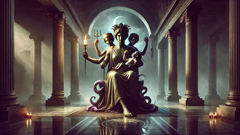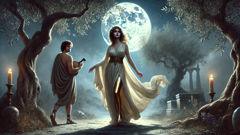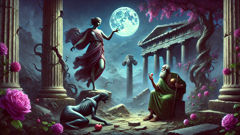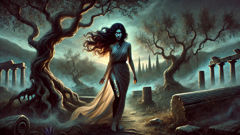Introduction
In the honeyed dusk of ancient Greece, when the moon loomed like a silver coin above shadowy olive groves, mothers drew their children close and whispered cautionary tales. Among the pantheon of gods and monsters, none inspired more tremulous fear and secret fascination than the Empusa. She was a creature born of midnight, said to walk the lonely crossroads and sun-dappled ruins just as night pressed in, her single bronze leg glinting in the starlight. While the tales changed with every telling, the essence remained: Empusa was both seduction and terror, beauty and abomination—a demigoddess with a hunger for mortal life. Her name was spoken in reverence and dread, for behind every vanished traveler, every inexplicable fever, villagers saw her shifting form. Yet, Empusa was more than a simple monster. Daughter of Hecate, goddess of witchcraft and the crossroads, she moved between worlds: flesh and spirit, desire and death. Her legend emerged from the fears and desires of a people whose lives pulsed in rhythm with the unpredictable earth. Empusa was a warning—against wandering too far, loving too recklessly, or believing too much in what the eye could see. But she was also a symbol, mysterious and powerful, her story woven with moonlight and the scent of wild thyme. To trace the Empusa’s legend is to travel deep into the heart of ancient Greece, where every ruin holds a secret and every shadow could be her. This is her tale: of longing, transformation, and the hungry edge of myth.
Origins: Daughter of Hecate and the Birth of a Legend
Empusa’s story begins not with her own voice, but with the whispers of those who feared her. In Thessaly, a land famed for its witches and moonlit rites, villagers told how she was born from the union of Hecate and a nameless spirit of darkness. Hecate, goddess of magic and guardian of the crossroads, shaped Empusa from shadow and bronze, giving her form and hunger. Legends said that on the night of Empusa’s birth, a chill swept through the olive groves, and the moon hid its face behind a cloud. The midwives who attended Hecate fled in terror, for they glimpsed the child’s shifting shape—first a girl of radiant beauty, then a beast with wild, burning eyes. By morning, only silence and strange footprints remained.

Empusa grew in secret, drifting between the world of mortals and the restless realm of spirits. She walked by night, learning the arts of transformation from her mother. Sometimes she wore the form of a young maiden, her hair scented with thyme and her smile bright as sunrise. Other times, she became a wraith, all teeth and hunger, with a single leg of gleaming bronze and another of shadow. Her favorite haunts were the lonely crossroads and crumbling temples where offerings to Hecate lay forgotten. She watched mortals from afar—fascinated by their laughter, their fragile joys, their pulsing veins. But longing was not love. Her nature was to devour, not to belong. The ancient poets called her a liminal being: neither fully living nor dead, neither wholly monstrous nor divine.
The first stories spread like wildfire through the countryside. Young men vanishing after a night’s revelry; shepherds found pale and empty-eyed at dawn; travelers struck by fever after glimpsing a beautiful stranger in the moonlight. Some said Empusa could take on any shape to lure her prey—appearing as a lover, a grieving widow, a lost child. But always, when the moment came, her illusion flickered, revealing the bronze leg and the eyes that burned with unnatural fire. Her victims were left lifeless, their essence drained as offering to her mother, Hecate. These tales terrified villagers, but they also gave rise to secret fascination. For those who survived an encounter described not only terror, but also an overwhelming sense of longing and beauty. Empusa was danger incarnate—a seductress who haunted dreams as well as roads.
Yet, the Empusa was not without rivals or enemies. Priests of Apollo warned against the temptations of the night, urging purity and vigilance. Witches invoked Hecate’s protection, leaving honey cakes and black lambs at crossroads to keep Empusa at bay. Still, nothing truly held her. She moved as she pleased, her legend growing with each new victim, each terrified witness. It was said she could slip through shadows, her bronze leg silent on ancient stones. In this way, Empusa became more than a monster—she became a symbol of the night itself: alluring, dangerous, and forever out of reach.
Moonlit Crossroads: The Empusa’s Hunt and Her First Love
On a warm summer evening, when the cicadas hummed like a thousand tiny harps, Empusa wandered the crossroads near Eleusis. The moon was heavy and low, painting the fields silver. From the thicket, she watched the road, unseen but watchful. Tonight, she felt a stirring in her spirit—not mere hunger, but curiosity. As midnight neared, a group of young men approached. They carried flutes and wine, laughing as they stumbled home from festival. Among them was Dorian—a poet’s son, pale and slender, with a voice that carried the sorrow of lost cities. He lingered behind, drawn by the moon’s spell and the soft night air.

Empusa slipped from the shadows, her shape melting into that of a maiden draped in white. Her bronze leg remained hidden beneath folds of silk. Dorian stopped, entranced by her presence. "Are you lost?" he asked, his words lilting with gentle concern. She smiled, and for a moment the world narrowed to just the two of them. They walked together, speaking of dreams and poetry, while night birds called from the olive branches above. Empusa felt something new—a trembling in her heart, a desire to be seen for what she was, not only as a lure or monster.
But her nature fought her every step. As dawn threatened, hunger gnawed at her, urging her to feed. She tried to resist, but when Dorian touched her hand, the illusion faltered. He saw her eyes blaze gold, the flicker of the bronze beneath her hem. He did not run. Instead, he asked softly, “Who are you?” Empusa wept—silver tears that steamed on her burning cheek. “I am no one,” she whispered, and vanished with the mist. Dorian returned home fevered and changed, haunted by her memory. He wrote verses of love and loss that would echo through the years, never knowing if he had met goddess, spirit, or dream.
Empusa wandered for days after, torn by what she’d felt and what she was. She began to haunt not only lonely roads but the edges of mortal longing—drawn to music, to laughter, to sorrow. Sometimes she would spare those who reminded her of Dorian, letting them pass untouched but changed. Her legend grew more complex: now she was not only a devourer but also a muse, inspiring poets, tormenting lovers. Yet, hunger remained. She fed rarely but with more violence, unable to reconcile her two halves. Her bronze leg grew heavier, her illusions more fragile. By the time the leaves began to turn gold with autumn, the Empusa was both more feared and more pitied than ever before.
Temptation and Fear: Empusa’s Encounter with the Philosopher
The city of Athens was not untouched by tales of the Empusa. In the winding streets beneath the shadow of the Acropolis, rumors swirled of young men who vanished after seeking pleasure on the fringes of the city. The philosophers who gathered in marble courtyards dismissed these tales as mere superstition—a warning against excess or the dangers of foreign women. Yet one among them, Theokritos, was different. A seeker of forbidden knowledge, Theokritos scorned the daylight truths of his peers. He believed in mysteries, in the power of the night, and in the stories that clung to the city’s edge.

One evening, Theokritos set out to find the Empusa, determined to prove or disprove her existence. He carried a sprig of garlic and a bronze dagger—talismans said to ward off evil. The moon was thin as a sickle when he reached the ruins beyond the city walls. There, by the broken columns and wild roses, he found her. She wore the face of an old friend long dead, her laughter rich with memory and loss. Theokritos did not flinch. He greeted her with the proper rites, naming her as Hecate’s daughter and offering wine. Empusa was intrigued; she had never met a mortal who greeted her without fear.
They spoke until dawn, their words winding through philosophy and magic, desire and despair. Theokritos asked her to reveal her true form, promising he would not turn away. With a shudder, Empusa let her illusions fall: one leg of gleaming bronze, one of shadow, her face shifting from beauty to beast and back again. Theokritos wept—not from fear, but from awe at the strangeness and sadness of her being. He begged her to spare him, not from death but from the loneliness she carried. Empusa hesitated. For the first time, she wondered if she was truly alone.
She let Theokritos live, but marked him with a single touch. From that night, he dreamed only of her—his thoughts haunted by bronze and moonlight. He became a wanderer, forsaking Athens for the wild places where Empusa roamed. His writings—fragments of poetry and philosophy—would one day be found in a hollowed olive tree, their ink faded but their longing undimmed. The city remembered him as a madman, but his legend entwined with hers. Through Theokritos, Empusa became a symbol not only of fear but of the yearning for what lies beyond understanding.
Conclusion
So ended the legend’s longest night, with the Empusa’s form flickering between shadow and moonbeam, her heart a storm of hunger and longing. In every village, mothers still warned their sons not to wander after dusk; poets whispered of the woman with a bronze leg who inspired both terror and love. Yet as centuries passed, the Empusa became less a monster to be feared and more a symbol—of all that is mysterious and dangerous in desire, all that can’t be tamed by reason or ritual. She lingered at crossroads both real and metaphorical, her story woven into every warning against excess, every lament for love lost to the night. Some said she found peace in solitude, learning to hunger for beauty rather than blood; others claimed she still walked among us, her shape changed by every new era’s fears. The truth, as always, slipped like mist between certainty and myth. In the end, the Empusa endures not because she devoured men, but because she spoke to something wild in every heart: the yearning for what we cannot fully know, and the dangerous thrill of stepping into darkness—if only for a moment, beneath the ancient Greek moon.













